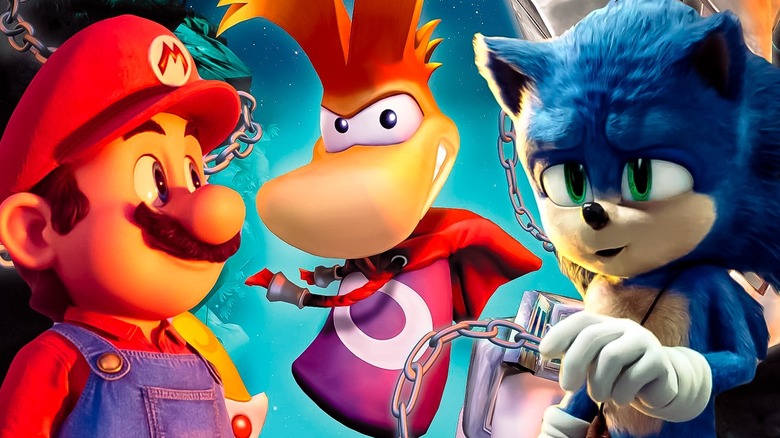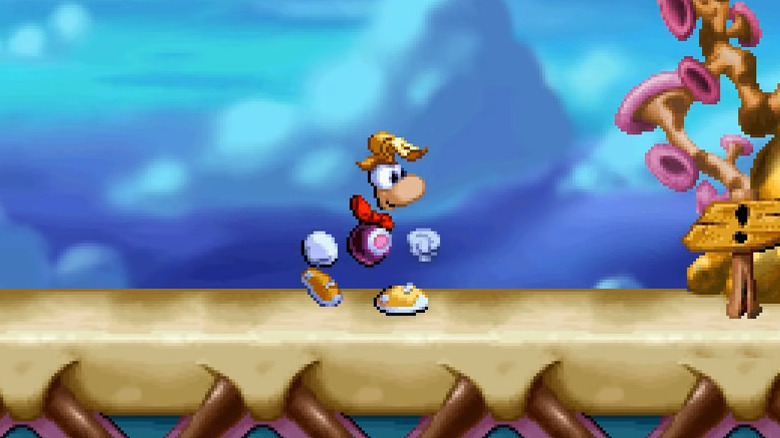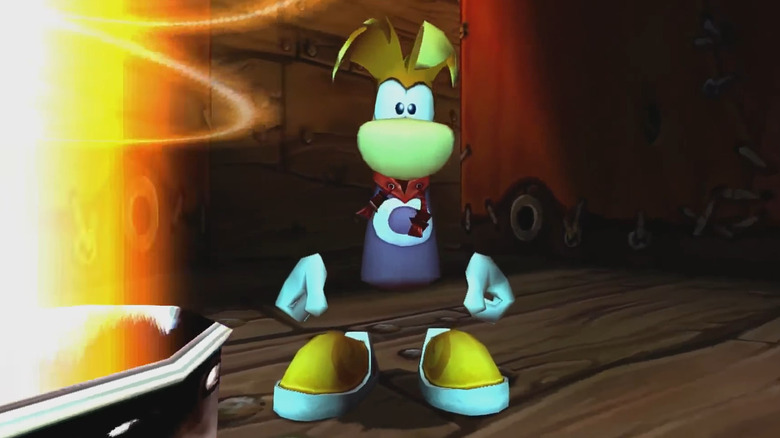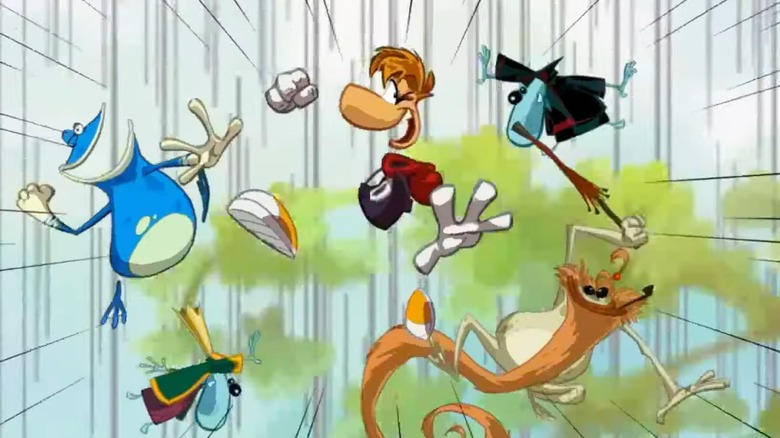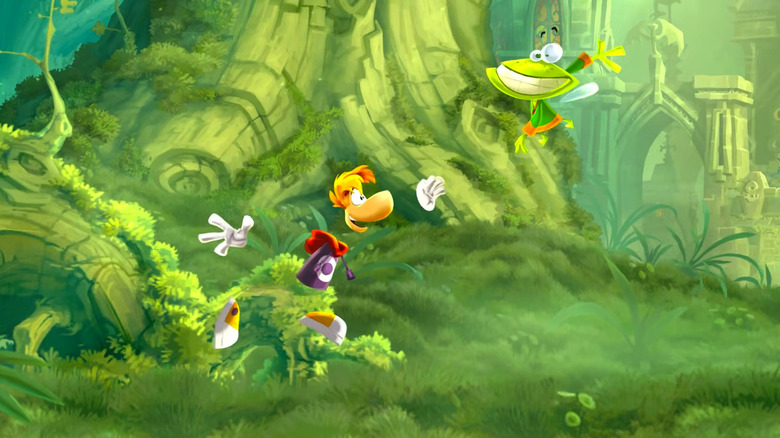Super Mario Bros. And Sonic Broke Records & It's Time For Rayman To Swing His Fist Into Movie Theaters
As you've probably heard, "The Super Mario Bros. Movie" blew away box office records.
The movie outstripped the box office earnings of literally every other animated film to ever exist, a title previously held by "Frozen 2." It's a feather in Nintendo's cap (and to a lesser degree, Illumination's), but it's an even bigger win for the gaming community, because "Mario" tops a growing list of successes in the realm of video game adaptations. Before Bowser debuted his Oscar-eligible hit single, Paramount's "Sonic the Hedgehog 2" carried the mantle for highest-grossing video game adaptation. And let's not pretend as though HBO's "The Last of Us" didn't garner global adoration, either.
Now, since the general public is starting to recognize just how good these video game adaptations can be (and since Hollywood is getting better at making them), it might be time to introduce audiences to another beloved gaming icon, one who's got almost as much platforming experience as Mario or Sonic — and that's Rayman.
Don't recognize him? That's okay, Ubisoft hasn't released a solo title for the guy since "Rayman Legends" in 2013. In fairness, the studio's been pretty busy running "Assassin's Creed" into the ground. But that's a story for another time. Here's why Rayman deserves the big screen treatment.
Rayman is a ... look, don't ask silly questions, okay?
In 1995, Ubisoft released "Rayman" for the Atari Jaguar, the Sega Saturn, MS-DOS, and the Playstation. The premise of the original title is simple – players control Rayman, a cute (but oddly loose) conglomeration of floating body parts, as he jumps and swings his way through a series of side-scrolling worlds to rescue the Electoons, little bits of sentient dream stuff, from Mr. Dark, a wicked sorcerer with Grade-A fashion sense. For context, the Collect-a-Thon aspect is reminiscent of "Sonic" games, and the aesthetic platforming is reminiscent of "Mario" games. Sequels added additional mechanics, like more playable characters and more battle functionality, and later games also experimented with the visual style, as well. However, the base elements of the Rayman universe, built back in 1995, remain mostly unchanged.
Rayman himself is something of an enigma. If Ubisoft has any legitimate explanation for what he's supposed to actually be ... well, nobody seems to be sharing. He just is, and the sooner we accept that, the better we'll all be, okay? That said, his personality is easier to nail down, because Rayman seems to be one of the most chill fellas out there. He's always smiling, he likes to tease the player from time to time, and he's always got a minute to take a silly picture. He might not be as verbose as Sonic, but he gets his point across just the same.
Rayman is built on a premise of infinite, bizarre possibility
Outside of HBO's "The Last of Us," which is basically a carbon copy of its source material, most modern adaptations seem to take a looser approach. If there's a "Sonic" title where the blue blur is raised by magic owls only to later become the adopted adult son of a sheriff and his wife in a quaint little human town ... uh, we haven't played it. And on the other end of the spectrum, "The Super Mario Bros. Movie" is a Frankenstein-like thing that adapts minor aspects from almost every game in the franchise.
Where should a "Rayman" adaptation best fall on this scale, narratively speaking? Probably somewhere in the middle.
The "Rayman" franchise is notably light on plot (a bad thing happens and then Rayman stops it through the power of shooting his fists). But it's packed with memorable world-building. We briefly mentioned that the Electoons are made of dreams, but we haven't touched on the full truth — the entire world of "Rayman" exists within the dream space of Polokus, a sleepy, bearded deity with a serious hookah addiction. Anything Polokus dreams, whether good or bad, becomes reality. Kind of opens up the realm of possibility for an adaptation to do anything it wants, doesn't it?
Rayman has a lot of friends (and a lot of enemies, too)
While, yes, a "Rayman" adaptation could feasibly go in any number of directions, there's already a wealth of characters to pull from. Like any good protagonist, Rayman has plenty of friends. There's Betilla, a red-haired fairy that bestows Rayman with magical power-ups in almost every game. There's Teensy Ray, a little guy who looks up to Rayman so much that he practically lives in cosplay. And there is, of course, Globox. He's Rayman's bulbous, amphibian sidekick in most games. Technically, he has a personality, but it changes drastically, depending on the title. Suffice it to say that he's usually strong but cowardly, and involved but dimwitted.
Rayman also has plenty of enemies. We already mentioned Mr. Dark. There's also the Magician, a figure who appears benevolent and friendly in "Rayman" (he even stars in some educational spin-off titles) but later proves himself a sinister foe in "Rayman Origins." However, the most recognizable enemies to come out of the "Rayman" franchise are the Rabbids. That's right, those demented bunnies that Mario's been chasing around for the last few years actually find their origin in "Rayman Raving Rabbids." It was almost a fair trade, though — in return, Rayman got to cosplay as Mario in "Rayman Legends." So it's totally fair.
Rayman's track record merits an adaptation
Rayman might not have the same financial staying power as Mario or Sonic, but his franchise is indisputably well-regarded. "Rayman Legends" is widely considered to be one of the greatest platforming adventures ever made, and its influence on pop culture is not insignificant. "Ori and the Blind Forest," a beloved 2015 indie title, shares a lot of its DNA with the last official "Rayman" game. And we've already covered how Nintendo clearly decided that "Rayman" (or at least its villains) holds value. Why not let the weird little guy star in his own movie? He's got the spine for it, metaphorically speaking.
The only problem is that Ubisoft's been burned before. 20th Century Fox's "Assassin's Creed" was ... a movie. Where's that "Assassin's Creed 2," again? Right. But animation is different than live-action, and "Rayman" would come to life in a growing market, whereas "Assassin's Creed" died in an oversaturated one. Plus, there's just no way that the partnership between Nintendo and Illumination won't lead to other animation studios attempting to recreate that box office magic. And a relationship between, say, DreamWorks and Ubisoft would foster the perfect environment for "Rayman" to thrive. Just as Polokus would want.
Yeah, we're never going to get over the hookah-god thing.
